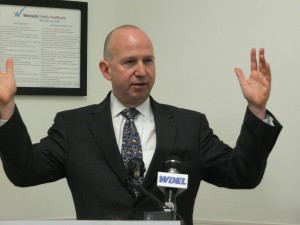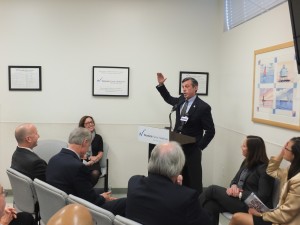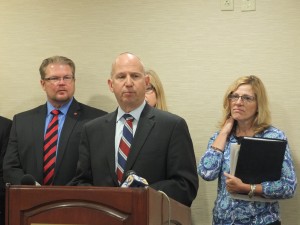Two Organizations Receive Federal Grants to Help Delawareans Get Covered Through the Health Insurance Marketplace
NEW CASTLE – Chatman LLC and Westside Family Healthcare were awarded federal grants today to help Delawareans learn about their options and sign up for coverage through the Health Insurance Marketplace. Open enrollment for coverage beginning Jan. 1, 2016, starts Nov. 1 and ends Jan. 31, 2016.
The Centers for Medicare & Medicaid Services (CMS) announced the following grants to fund the work of certified enrollment assisters known as navigators:
• Chatman LLC, $339,096
• Westside Family Healthcare, $260,904
The awards announced today cover the first year of a three-year grant that runs until Sept. 1, 2018. The funds will support outreach efforts designed to help Delawareans understand the coverage options and financial assistance available at HealthCare.gov.
Chatman, whose Delaware office is at Widener University Law School on U.S. 202 near Wilmington, has employed navigators in Delaware during each of the first two open enrollment periods. Chatman will serve underserved populations statewide, with particular outreach to minorities, special needs individuals, Latinos, African Americans, young adults, immigrants, those with limited English proficiency, and rural residents.
Westside, a federally qualified health center with several locations in New Castle and Kent counties, will primarily serve individuals and families in those counties and will expand its current outreach and education program, which works with existing Westside patients and conducts outreach in the community.
Westside also employed federal navigators last year and was one of four organizations that employed Marketplace guides, who performed similar outreach and education roles during the first two years of Delaware’s Health Insurance Marketplace. Contracts for all four Marketplace guide organizations ended last spring.
Navigators provide free, objective information about health coverage to consumers to help them make the best possible choice. They are knowledgeable about the qualified health plans available in Delaware’s Health Insurance Marketplace and public programs including Medicaid and the Children’s Health Insurance Program (CHIP).
Through the first two years of the marketplace, 25,036 Delawareans enrolled for private health insurance coverage, with enrollment increasing 74 percent from Year 1 to Year 2. As of March 2015, a total of 22,297 Delawareans were paying their monthly premiums and had active coverage.
“The Affordable Care Act is expanding access to health coverage for thousands of hard-working people in Delaware, but picking the right plan and understanding the benefits it offers can be confusing,” said U.S. Senator Tom Carper. “Health care navigators help make that task a little easier. These federal grants will help to spread the word about resources available to consumers who have questions and need assistance enrolling in health plans through Delaware’s marketplace. This crucial federal investment will go a long way toward getting every person in our state the health coverage they deserve.”
Added Congressman John Carney: “More Delawareans are enrolling in health insurance than ever before. They need help to make smart, informed choices for themselves and their families. The navigators supported by this federal grant have already helped thousands of Delawareans. They’ll continue to be an important resource as we get closer to the next enrollment period.”
Federally funded navigators were a key part of Delaware’s enrollment assistance efforts during the first two years of the Health Insurance Marketplace, and they are expected to play an even more critical role now that the state’s contracts with Marketplace guides have ended. Navigators will join agents and brokers, certified application counselors and staff from federally qualified health centers to provide enrollment assistance in Delaware.
“Navigators are in-person, community-based resources for those who need help understanding their health coverage options and how to sign up for a plan,” said Secretary Rita Landgraf of the state Department of Health and Social Services. “We look forward to working with the experienced, trusted partners at Chatman and Westside to help Delaware’s remaining uninsured residents get coverage that fits their needs and that connects them to quality care. We will especially rely on the navigators as we continue to engage traditionally hard-to-reach populations such as Latinos and young adults.”
Delawareans who need health insurance before Jan. 1, 2016, can still get covered if they qualify for a special enrollment period due to a life change like getting married, having a baby, or losing other coverage, or through Medicaid and the Children’s Health Insurance Program, which provide coverage to families and individuals with limited income or other circumstances.
For information about Delaware’s Health Insurance Marketplace and how to contact navigators for assistance, go to www.ChooseHealthDE.com or call the federal Marketplace help center at (800) 318-2596.
For more information, contact Jill Fredel, Director of Communications, (302) 255-9047 (office) or (302) 357-7498 (cell).
-30-
Delaware Health and Social Services is committed to improving the quality of the lives of Delaware’s citizens by promoting health and well-being, fostering self-sufficiency, and protecting vulnerable populations.



